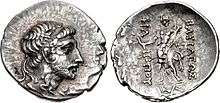Andriscus
Andriscus (Ancient Greek: Ἀνδρίσκος, Andrískos), also often referenced as Pseudo-Philip, was the last king of Macedon (r. 149–148 BC). A pretender, who claimed to be the son of Perseus of Macedon, he was a fuller from Adramyttium in Aeolis in western Anatolia. His reign lasted just one year and was toppled by the Roman Republic during the Fourth Macedonian War.

Life

In 168 BC, the Romans invaded Macedonia and overthrew King Perseus in the First Battle of Pydna.
In 149 BC, Andriscus, claiming to be Perseus' son, announced his intention to retake Macedonia from the Romans.
Andriscus travelled to Syria to request military help. Instead he was handed over to the Romans, but Andriscus managed to escape from Roman captivity and raised a Thracian army. With this army, he invaded Macedonia and defeated the Roman praetor Publius Juventius. Andriscus then declared himself King Philip VI of Macedonia.[1]
In 148 BC, Andriscus conquered Thessaly and made an alliance with Carthage, which angered the Romans who declared war (Fourth Macedonian War) on Macedonia. He was defeated by the Roman praetor Quintus Caecilius Metellus Macedonicus in the Battle of Pydna. Following the battle, he fled to Thrace, whose prince gave him up to Rome, thus marking the end to Andriscus' reign of Macedonia. Macedonia was then formally reduced to a Roman province.[1]
It was said that Andriscus' brief reign over Macedonia was marked by cruelty and extortion.
References
Sources
| Wikimedia Commons has media related to Andriskos. |
- Velleius Paterculus i. 11; Florus ii. 14;
- Livy, Epit. 49, 50, 52; Diod. Sic. xxxii. 9.
Attribution


